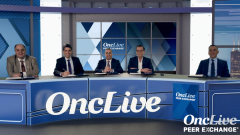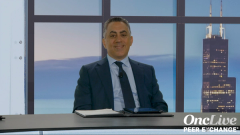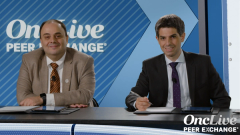
Real-World Selection of Frontline Combination Therapy for Advanced HCC
Taking into account respective data from IMbrave150 and HIMALAYA, experts consider how they might select frontline therapy for advanced HCC.
Episodes in this series

Transcript:
Tanios Bekaii-Saab, MD: Mark, in discussions, this gets advertised as the alternative to ATEZO-BEV [atezolizumab-bevacizumab], which as you discussed previously is your preferred standard, especially for those patients at highest risk of bleeding, but then they excluded those patients. Between this and the secondary endpoint of PFS [progression free survival] was intriguingly negative, disappointing is one way to put it. Mark, how do you take this into your practice?
Mark Yarchoan, MD: You really stuck me with the hard question. We have 2 positive frontline phase 3 studies now, both randomized against sorafenib. And maybe more to come that we’ll probably talk about. Technically, it’s not right to do these cross-trial comparisons because these are different trials, but the truth is we need to pick a regimen and we do what we have to do, which is try to parse signals from the data. This is the same challenge that comes up in other tumors, such as renal cell where you have VEGF/IO [vascular endothelial growth factor/ immuno-oncology] vs IO/IO. These are the sort of trends that come up over and over again. The strength of IO/IO is the tail of the curve and sure enough, the tail of the curve for DURVA-TREME [durvalumab/tremelimumab] is very nice. We don’t have that length of follow-up yet for ATEZO-BEV but I think the response rate is higher than DURVA-TREME if you need a response for someone with a lot of disease where you need to get disease control from the available data.
Tanios Bekaii-Saab, MD: Well, let’s ask that question. When do you decide which patient is the patient you’re going to say, you are not a candidate for ATEZO-BEV but I think you’d be a perfect candidate for DURVA-TREME based on the data that we have today?
Mark Yarchoan, MD: There are truly VEGF-ineligible patients, and these are patients with very recent surgery, heart attacks, and recent bleeds.
Tanios Bekaii-Saab, MD: So very few patients.
Mark Yarchoan, MD: Those are the patients where I think there’s no question DURVA-TREME is a compelling regimen.
Tanios Bekaii-Saab, MD: Anthony, what do you do in your clinic?
Anthony El-Khoueiry, MD: I follow the same approach, where ATEZO-BEV continues to be the go-to regimen with DURVA-TREME being the backup option. We’ll see how that regimen performs in real-world as well. That remains to be seen.
Tanios Bekaii-Saab, MD: Means we must use it in the real world. How are you using it in your clinic?
Anthony El-Khoueiry, MD: Well, it’s not approved at the moment, so I have not used it in the clinic but again, if it is available, it would be for the patients that have clear VEGF contraindications like was just mentioned.
Tanios Bekaii-Saab, MD: Arndt?
Arndt Vogel, MD: One point to add is liver function. As you know, I’m interested in ALBI [albumin/bilirubin] score and the meaning for prognosis and efficacy of the drugs we are using now. These are all post hoc analyses, but as said before, we must pick something to make decisions. That liver function is very important in terms of prognosis, but what about efficacy? And what have you learned or what have you seen in the past? I think for most drugs and combinations, we have seen that the efficacy is higher in patients with a good liver function ALBI [grade 1]. This was specifically pronounced in the IMbrave150 [NCT03434379] study; or ALBI [grade 2], ALBI [grade 2a] patients, the curves were almost overlapping with sorafenib. In contrast, in IB1 patients, the median overall survival was not yet reached for ATEZO-BEV, indicating patients with a good liver function are candidates for ATEZO-BEV. What about patients with a more impaired liver function? In the IMbrave study with prospective data, it indicated that these patients might not derive a big benefit. I think they do have a benefit but compared with sorafenib it’s more moderate. Therefore, the real-world data can help. We have recently published data from 14 centers in Germany where we picked 150 patients treated with ATEZO-BEV after the study was published. It was a mixture of patients in the first line and second line, so we did not observe an effect on the line of treatment. That did not matter but, interestingly, we observed a strong effect of liver function and we called them IMbrave in and out. Those that would have fulfilled the inclusion criteria did well, but those that did not meet the inclusion criteria did not do as good as we have thought. This is specifically true for patients with a more impaired liver function. Some of them tried to be and I think this is a little bit in line with the real-world data we are seeing at the moment from other centers. One was just recently published by David Pinato’s [, MD, PhD,] group in hepatology [Imperial College, London, England]. He observed, moderate median overall survival in this patient population of around six months. It’s all like post hoc retrospective, you need to be extremely cautious. Looking at liver function is valid and we need to understand, are there any regimens which might perform better in these patients, which are the majority of the patients I see in my clinic?
Transcript edited for clarity.










































